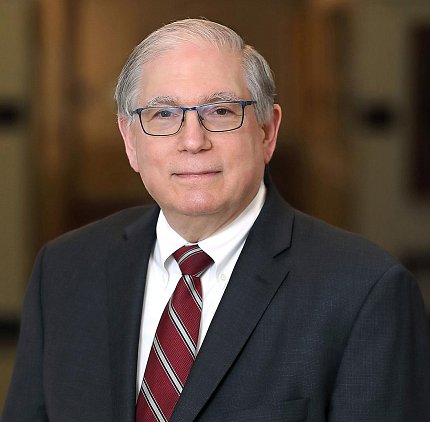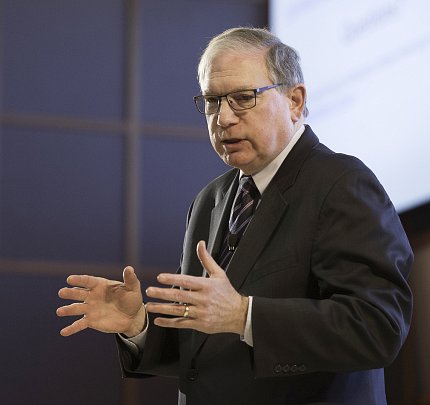Principal Deputy Director Tabak Retires

NIH Principal Deputy Director Dr. Lawrence Tabak retired from federal service earlier this month after 25 years of service.
Tabak has held critical NIH leadership roles since 2000, most notably in his current role as the second in command since August 2010, and two years as the acting NIH director from December 2021 to November 2023.
“Larry Tabak is a classic example of the unsung hero," said NIH Chief of Staff John Burklow. "He never seeks the limelight—in fact, he always dodges it. And it’s genuine humility--not an act. Despite his modesty, his fingerprints are on virtually every major initiative that has emerged from NIH over the last 15 years. Larry also has been a transformative mentor to many scientists and scientific administrators over many years. I’ll always be indebted to him for all he taught me, mostly by example. And underneath his famous deadpan expression is one of the kindest, most caring persons I know."
Dr. Alfred Johnson concurred. “Working with Dr. Tabak was always a rewarding learning experience, especially when we were dealing with major challenges,” said Johnson, NIH deputy director for management and chief financial officer. “He constantly provided steady, thoughtful guidance and was always considering what is best for the NIH community.”
Tabak also served as the deputy ethics counselor since August 2010 and as director of the National Institute of Dental and Craniofacial Research (NIDCR) from 2000-2010. In addition to his administrative duties, he maintained a research laboratory within the NIH intramural program studying glycoprotein biosynthesis and function.
“Over 138 years of NIH’s existence, there may have been principal deputies who were more dedicated, wise and selfless than Larry Tabak, but I rather doubt it,” said former NIH Director Dr. Francis Collins. “In his service as director of NIDCR, followed by 15 years as my right arm in the Director’s Office, Larry was often the guy asked to tackle the thorniest problems of the organization. Regularly called upon to lead advisory groups, Larry brought his special blend of realism, vision and scientific knowledge to find solutions.
“He was a master of shepherding a group of outside experts through data gathering, intense discussion of options, and ultimate consensus on a conclusion of lasting value. It was my great joy and personal privilege to work in partnership with Larry. NIH owes him a huge debt of gratitude.”
“I have worked with Larry for over 30 years,” said Dr. Kelly Ten Hagen, associate scientific director at NIDCR. “I cannot overstate how much his selfless support, guidance and mentorship have helped those of us who worked with him navigate our careers and lives. He is one of the few people who truly had our best interests at heart. And his tireless devotion to the NIH and the biomedical enterprise it supports is obvious. He will be greatly missed!”

Prior to joining NIH, Tabak was the senior associate dean for research and professor of dentistry and biochemistry & biophysics in the School of Medicine and Dentistry at the University of Rochester, New York.
Tabak is an elected member of the National Academy of Medicine of the National Academies. He received his undergraduate degree from City College of New York, his D.D.S. from Columbia University and a Ph.D. from the University of Buffalo.
In a statement emailed to all staff, NIH Acting Director Dr. Matthew Memoli wrote, “Dr. Tabak has helped shape important policy decisions at NIH over four administrations. He has guided NIH through complex issues and will be sorely missed.”
Dr. Tara Schwetz, who worked alongside Tabak from 2021-2023 as NIH acting principal deputy director, said, "Throughout his career, Larry has been the epitome of selflessness, constantly and consistently putting others before himself. As a mentor, his wisdom and strategic mindset have not only shaped those fortunate enough to have worked alongside him, but have also empowered them to explore and advance their careers in new ways.
"His legacy is one of unwavering encouragement and guidance, always seeking to elevate those around him—regardless of his own personal circumstances—ensuring their success will continue and his impact will reverberate."
